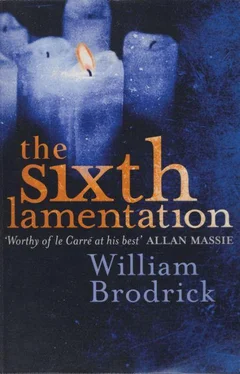William Brodrick - The Sixth Lamentation
Здесь есть возможность читать онлайн «William Brodrick - The Sixth Lamentation» весь текст электронной книги совершенно бесплатно (целиком полную версию без сокращений). В некоторых случаях можно слушать аудио, скачать через торрент в формате fb2 и присутствует краткое содержание. Жанр: Триллер, на английском языке. Описание произведения, (предисловие) а так же отзывы посетителей доступны на портале библиотеки ЛибКат.
- Название:The Sixth Lamentation
- Автор:
- Жанр:
- Год:неизвестен
- ISBN:нет данных
- Рейтинг книги:5 / 5. Голосов: 1
-
Избранное:Добавить в избранное
- Отзывы:
-
Ваша оценка:
- 100
- 1
- 2
- 3
- 4
- 5
The Sixth Lamentation: краткое содержание, описание и аннотация
Предлагаем к чтению аннотацию, описание, краткое содержание или предисловие (зависит от того, что написал сам автор книги «The Sixth Lamentation»). Если вы не нашли необходимую информацию о книге — напишите в комментариях, мы постараемся отыскать её.
The Sixth Lamentation — читать онлайн бесплатно полную книгу (весь текст) целиком
Ниже представлен текст книги, разбитый по страницам. Система сохранения места последней прочитанной страницы, позволяет с удобством читать онлайн бесплатно книгу «The Sixth Lamentation», без необходимости каждый раз заново искать на чём Вы остановились. Поставьте закладку, и сможете в любой момент перейти на страницу, на которой закончили чтение.
Интервал:
Закладка:
Jacques was the coordinator among ourselves. He would be the sole link with Father Rochet and would tell each person where and when to do ‘a run’, distributing any travel papers that might be needed. He was the natural choice because members of his family, based in Geneva, handled the other end of the escape route.
Father Rochet stressed that if caught, stay calm and blame him. ‘All you have to do is say I told you the parents were ill, and I’d asked you to take the children to stay with a relative. Leave the rest to me.’ I asked him wasn’t he frightened of what they might do to him? ‘No, no,’ he laughed. ‘I’ve lived among tombs all my life. I’m not scared of dying.’ Afterwards, Jacques said that worried him because there was a weak streak in Father Rochet. He often smelled of wine, even though he was a priest. He was the sort who might well cave in under the pressure. ‘Never,’ I said.
I did several ‘runs’, my own boy on one arm, a little charge in the other. They passed without hitch or hindrance.
4th May
About this time there was another order from on high. All Jews had to register the names of their children. That is what it was like. Every now and then there’d be a new requirement or regulation affecting the Jews. The next one was to wear a six-pointed star with ‘Juif’ printed across it. Jacques and some friends from the university decided to protest by wearing a star with their names on. Come to think of it, I think Jacques’ said ‘Catholique’. He was duly arrested. The memory of that day is bitter for many reasons.
Almost overnight, thousands of people suddenly became visible, separated from everyone else by a single piece of yellow cloth. I saw two girls, twins, walking hand in hand, dressed in the same clothes, and with sky-blue ribbons in their hair. Over their hearts, neatly sewn, were these yellow stars the size of my hand. I stopped on the pavement and watched them pass, dumbfounded.
That makes me think of Madame Klein, a week or so before the regulation came into force. She is sitting by a tall lamp-stand, glasses on the end of her nose, carefully sewing the yellow cloth on to her black dresses. She has three of them. I don’t remember her going out any more. She took fresh air by the window, describing the statues of musicians in Parc Monceau, or the turns in the paths and the odd people she used to meet there.
Worried about Jacques after his arrest, I went to see Victor at Avenue Foch, hoping he could help. On the way I saw Father Rochet. He looked more dishevelled than usual and nipped down a side street. Anyway, Victor crawled from under his stone and I asked if Jacques was all right. He couldn’t even bring himself to speak to me. He just stared back in a way that scared me and showed me the door.
A few days later I bumped into him on the Champs-Elysees. ‘I know what you’re up to,’ he said. And he warned me to back off from the heroics. I suppose I should have seen it then, that he was capable of selling us all down the river. But it never entered my head. Instead, I did something which, I’m ashamed to say I have often relived these past fifty years. I gave him a great big belt across the face. It was glorious.
13th May
The end came on 14th July 1942, Bastille Day I had been given a ‘run’. It was straightforward enough. I went to a dummy social club, set up by OSE, and there I collected a little boy I met his mother. She was about my age but very beautiful, with dark green eyes. Needless to say she was distraught. It was like a scene in a film about a sinking ship. I am there, taking the boy who will survive, but with no space left on the lifeboat. Anyway the mother had no papers, so the plan was I would leave my boy with her and her son would come with me, relying on my papers if we were stopped. Her last words to him were, ‘I’ll see you very soon.
I took the train from the Gare de Lyon to a village in Burgundy I was met by a monk who took me to a convent with an orphanage. That was it. I took the next train back to Paris.
I got to the social club in the middle of the afternoon. They told me my boy had cried after I’d gone so I took him straight home. Trudging up the stairs, I heard a low cough from am open door. It was an old busybody who lived on the first floor, Madame Vigmot, who often complained about the noise. She shook her head, pointing up at the ceiling. I leaned in. She whispered that Madame Klein had been taken away She’d fought and they’d dragged her down the stairs by her hair. Then three others had come, half an hour ago. They were waiting upstairs. I asked for a description and one of them was obviously Victor. There was a German soldier and a nurse.
I walked out on to the landing. That was the turning point in my life. Because I could have walked down the stairs, on to the street and out of Paris. But it was only Victor. He’d come to explain about Madame Klein, with the nurse. All my papers were in order. There was nothing to fear. The German just wanted to know why I was living with a Jew Anyway, I hadn’t seen Jacques, I couldn’t just slip away So I went up the stairs. It all happened very quickly, but in my mind it is painfully slow
The German soldier was Eduard Schwermann. I had seen him once before, sitting with Victor in a cafe. Father Rochet had pointed them out to me. Well, Schwermann barked something. Victor asked for my papers; everything — birth certificate, baptism certificate, the lot. I passed them over. Another bark. He wanted my parents’ papers. Shaking like a leaf, I dug them out of the cupboard. My boy started to cry Schwermann didn’t look at a single piece of paper, he just put them in his pocket. He barked again. ‘Downstairs,’ said Victor. Off we went. The nurse followed.
I was taken into the street and round a corner, where a couple of parked vehicles were waiting — a truck with some soldiers in the back and a car. Both engines started. The rest is a blur. As I was being pushed into the back of the truck Schwermann pulled my boy out of my arms and handed him to the woman. She ran to the car and it pulled away I was dragged off my feet, kicking and screaming. I can’t remember much after that.
21st May
I don’t know how long I was locked up in Paris, and I don’t know when I left. But I was taken to La Sante prison and later transferred to Auschwitz.
It was in that appalling place that I had a bit of luck. I’d been there about four or five months. Up at 3 a.m. Standing in the yard until 7 a.m. Then labouring till I dropped. Constant, indiscriminate beating. One afternoon, a group of French women arrived. About two hundred or so. They marched through the gates singing ‘La Marseillaise’. They were political prisoners and their detention at the camp was later the subject of a complaint by some government or other. I didn’t get to know them immediately because I got typhus. For ten months I was in quarantine, and that probably saved my life because I was pulled out of the Auschwitz regime just as I was losing the will to survive. For six months I lay in a bunk beside Collette Beaussart, a former journalist who’d been deported because of what she thought rather than anything she’d done. Every day we talked of the simple things we’d like to do if ever we were free. She wanted to make jam and I wanted to eat it. I can’t remember what else we said, but the words formed a sort of ladder and I clung on to them, unable to move up but not slipping any further down. When I came out of quarantine, the French politicals were being moved to Ravensbruck the next day in response to the protest. By some clerical error, or so I thought, my name was on the transfer list. In fact, Collette had told the camp officials I was one of their number.
We left Auschwitz in 1944 and I remained at Ravensbruck until it was liberated by the Russians. I worked like a slave in the Siemens factory, making telephone equipment. I thought it would never end. When it did, the Germans abandoned the camp, leaving a few of us behind to deal with the sick.
Читать дальшеИнтервал:
Закладка:
Похожие книги на «The Sixth Lamentation»
Представляем Вашему вниманию похожие книги на «The Sixth Lamentation» списком для выбора. Мы отобрали схожую по названию и смыслу литературу в надежде предоставить читателям больше вариантов отыскать новые, интересные, ещё непрочитанные произведения.
Обсуждение, отзывы о книге «The Sixth Lamentation» и просто собственные мнения читателей. Оставьте ваши комментарии, напишите, что Вы думаете о произведении, его смысле или главных героях. Укажите что конкретно понравилось, а что нет, и почему Вы так считаете.












